Through Wind, Snow, Rain, Sleet & CoVid - Education Goes On
Or ... the Wild and Whacky World of Online Learning in the Age of CoVid
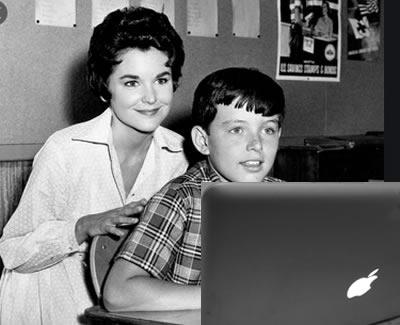 April 27, 2020 / Corona Virus in NYC & NYS CoVid 19 / NYC Neighborhoods / News Analysis & Opinion / Gotham Buzz NYC.
April 27, 2020 / Corona Virus in NYC & NYS CoVid 19 / NYC Neighborhoods / News Analysis & Opinion / Gotham Buzz NYC.
As we anxiously await the return to the new normal, being bombarded by repetitious daily TV newscasts, the Donald's Daily Disinformation Show, and what seems Rupert Murdoch's unending propaganda in the Wall Street Journal and on Fox News, there are a few bright spots, but you have to look for them.
I thought the migration from school classrooms might be one of them, so I set out to find out what that experience felt like to both educators and students at the elementary, high school and college levels. As I interviewed only two students and two teachers, this is an anecdotal report about the migration from classroom to computer.
The mass migration began the week beginning March 9th, 2020. College students around the nation, including the CUNY and SUNY systems, were told their classes were being discontinued and they were instructed to pack their things and return home. By the start of the next week, beginning March 16th, NYC public elementary and high schools were also closed. Private schools more or less closed their doors in tandem with the public schools.
During that week of disbandment, the world of education began a mad scramble to figure out how to continue the education process - without classrooms, schools and interpersonal contact. This was not a mean feat.
Nonetheless, educators scrambled, ramped up to speed using interactive platforms like Zoom and Google Hang Out, which includes Google Meet & Chat, and Google Docs. The educators also started figuring out how replace lectures and moderated classroom discussions by using videos and presentations / documents.
Based on the four interviews I conducted, it seems there wasn't any one formula used, but rather a whole slew of different approaches. Teachers used more different approaches to online learning - depending not just on the subject matter - but also on the audience aka the class.
College Professor's Experience Migrating Online
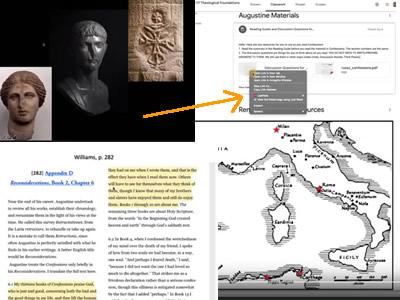 Thomas Bolin is a religious studies professor at a small liberal arts college. He teaches three classes - one is about American Evangelicalism, which examines the changing face of religion in America. He teaches two classes of Ancient Wisdom, which examines Biblical, Roman and Egyptian philosophies. This course ends with each student creating their own personal philosophy.
Thomas Bolin is a religious studies professor at a small liberal arts college. He teaches three classes - one is about American Evangelicalism, which examines the changing face of religion in America. He teaches two classes of Ancient Wisdom, which examines Biblical, Roman and Egyptian philosophies. This course ends with each student creating their own personal philosophy.
Professor Bolin said he started by taking a technology inventory of his students including computer and internet access. The real technological issue wasn't access to devices as nearly everyone has a smart phone and computer but rather access to internet with enough bandwidth at the times needed.
After he'd completed the technology inventory, he set out devising a teaching game plan. To that end he began developing videos, which he posted so that the students could access asynchronously - meaning on their timeframe. His reasoning was that as some of his students lived in different time zones, and some had issues accessing high speed internet at home because of shared bandwidth and devices, this would enable all to keep pace with their classroom peers.
He said he receives a slew of student emails after each video post, which he answers personally. He said he also checks in with each of his students at least once per week.
Professor Bolin also said that he began creating reading guides for many of the assigned readings to initiate interaction, circular discussions and he paired student to interact.
I asked him if he was working more or less these days. He said more ... that the five day week had become a continuous stream of seven day weeks ... that work filling his days has become like gas filling a room.
He noted that it's far more difficult to tell how plugged in each student is to the subject matter. He said that it was likely for that reason that Princeton went to Pass / Fail when they initiated the migration from in class to online. He opined that in spite of the additional work he's had to do, the students were likely getting a reduced educational experience. And hence, he reasoned, the pass / fail is a means of acknowledging the reduced expectations.
I'm paraphrasing but he said something like, "Education is learning about and through community, interpersonal interactions, which ultimately lead to growth. That's not something that can be well replicated online."
- CLICK here to read the rest of our report on education, remote learning and online schooling in the time of CoVid pandemic in NYC.
Through Wind, Snow, Rain, Sleet & CoVid - Education Goes On
Or ... the Wild and Whacky World of Online Learning in the Age of CoVid
April 27, 2020 / Corona Virus in NYC & NYS CoVid 19 / NYC Neighborhoods / News Analysis & Opinion / Gotham Buzz NYC. Continued.
Manhattan College Student's Experience Migrating to Online Learning
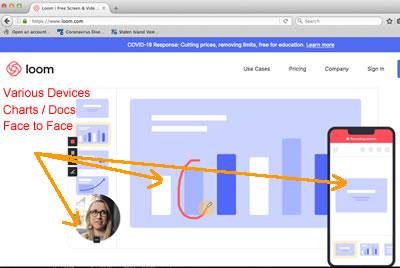 I then checked in with Lily, a college sophomore at a northeastern liberal arts college, to get a sense of the online learning experience from the student perspective. Lily was taking a wide variety of humanities and social science classes including Philosophy, Political Science, International Relations, French Narratives and one focused on the Linguistics of the Silk Road.
I then checked in with Lily, a college sophomore at a northeastern liberal arts college, to get a sense of the online learning experience from the student perspective. Lily was taking a wide variety of humanities and social science classes including Philosophy, Political Science, International Relations, French Narratives and one focused on the Linguistics of the Silk Road.
Lily's school made the decision to send students home the week beginning March 9th and it sounded like they knew the semester was over for the school year. The students had a week to move out and get ready to continue classes online about a week later.
Some of her classes were given via Zoom at the pre-scheduled times, continuing online the program they'd planned for the classrooms. But others were done as described by Professor Bolin, where materials and lectures were delivered asynchronously so the students could access the content on their schedules.
The Zoom classes are lectures with student / teacher interactive capability. The teacher can call on students to participate while online and students can raise their hands in Zoom to be recognized for comments and questions. For a couple of her classes, she's had to give presentations online.
Assignments given as per usual and most are reading based. The students turn in their assignments online and she also took an exam online. It was done live over the course of one and a half hours. The exam was not multiple choice, but rather an open book using short answers and two essays.
Lily said she was struggling to get her work done and oftentimes leaves things for the last minute - something she had not while in attendance in person at school.
She noted that there's no separation between relaxation and studying. So there's a loss of motivation and it's easy to get distracted. She told me that, the "Perceived amount of infinite time makes you want to do less". This seemed to echo Professor Bolin's sentiment about gas expanding to fill a room.
And she misses her peer group interactions, as she would be talking about her studies with her friends at school. But now, with social distancing, there's less to talk about events wise with friends.
Lily told me that her school had moved to pass / fail grading. She said that not being graded diminishes the incentive to perform, because even if you do perform, you'll never know how well you did. She said, "Pass / Fail is an option for tuning out".
She told me that if this continues into the Fall, many of her friends say they will consider skipping a semester or two until the teaching comes back to the classroom.
NYC High School Sophmore's Experience Migrating to Online Learning
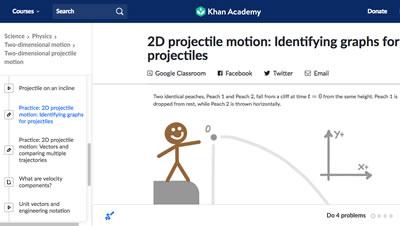 Ethan is a sophomore at an NYC high school. He's taking Algebra II, Conceptual Physics, British Literature, Spanish and World History II. It's amazing to me how sophisticated the high school curriculum is, which I hear a lot of parents saying too, as they're being asked to assist in educating their children.
Ethan is a sophomore at an NYC high school. He's taking Algebra II, Conceptual Physics, British Literature, Spanish and World History II. It's amazing to me how sophisticated the high school curriculum is, which I hear a lot of parents saying too, as they're being asked to assist in educating their children.
His school ended during the middle of that fateful week beginning March 9th. His school had a spring break coming, so they kept the break and classes resumed on schedule, online, in the same time period they would have if CoVid 19 had not swept the city.
Ethan's class schedule was reduced to Mondays and Wednesdays. The other three days the teachers are available for one on one interactions. I asked him if he'd taken advantage of the increased one on one teacher access and he said not really.
Ethan's school uses Google Hang Out as the electronic teaching platform, but they supplement the platform with others as well. The classroom days are filled with live lectures as well as chalkboard type presentations.
One of the websites they use is called Kahoot, which is a game based learning platform where the users can create pop quizzes with social interaction via multiple user chalkboards. Another website Ethan mentioned was QuizLet which uses a flash card method for various subjects that are created by the users to aid students learning in a manner not unlike the paper flashcards of way-back-when. I was told that this website is a very useful aid in preparing for tests.
Ethan said he was not quizzed in class like prior to the CoVid classroom to online migration, but that his homework load had increased. He said he's working harder, but less efficiently which seemed to echo Professor Bolin's remark on the teaching side. They're both putting in more effort, but getting less productivity out of it.
As a high school student, one of the things Ethan misses most is the social interaction with his peers. He said before the CoVid outbreak he would get up in the morning and get moving along with the rest of the city. He would use mass transit, walk, enter the school where the student body was milling about and then enter a classroom for face to face with the teacher and his fellow students.
Now he gets up, sometimes he doesn't even get dressed and takes his first class in his pajamas. Then he sits in front of the computer pretty much all day watching his classes online. There's little variation and little stimulus and he misses the social interaction. He told me that he goes to class, watches Netflix, and does his homework all in same spot. And that he doesn't like it.
He said he doesn't interact with his friends as much since the CoVid shutdown, because there's less to talk about that's not the same, and you don't have the shared everyday experiences of being in the same place at the same time.
The homework is largely the same. Except for Math and Physics the homework is done on the Khan Academy website. The Khan Academy is full of videos and short learning tools that help educators teach and students learn.
Ethan said that he wishes he was still in school. He said the online experience was dissatisfying. He noted that the lack of social interaction was hard to live with, and that it was also hard to learn when you're attending just two days per class per week. It's also frustrating because Ethan said he and his fellow students will have to catch up on what they missing now, after this pandemic is all over.
Elementary School Teacher's Experience Migrating to Online Teaching
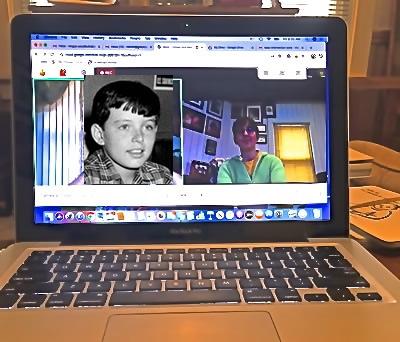 Megan Bolin is an elementary school reading specialist in a small private school in the Midwest. Her job is to work with kids who have trouble reading and writing English through what she calls interventions. Most of the work she does is one on one and it's with kids who are not at the top of the socio-economic ladder.
Megan Bolin is an elementary school reading specialist in a small private school in the Midwest. Her job is to work with kids who have trouble reading and writing English through what she calls interventions. Most of the work she does is one on one and it's with kids who are not at the top of the socio-economic ladder.
While the school ensured all kids had computers, many of them don't have access to internet hookups. Some have parents who are working in essential services and take their internet with them, leaving the kids without internet access during the day. So while they could possibly find a place near a local library or Starbucks to do their homework, in pragmatic terms it's not realistically feasible.
Hence, as a result of the CoVid shutdown, Megan informed me that many of these kids have sort of fallen off the grid, as they're struggling to keep up with their regular classes - let alone trying to keep up with an interventionist / extra course.
But for those who are in a position to keep their learning progress moving, Megan uses Google Meet. She works with the kids mostly one on one and using a combination of video and text documents, works with the kids in real time on developing their language skills.
She said that while she was working with a smaller student population, she found herself putting in the same hours. Her school has continued teacher meetings too, as they have found it beneficial to share their experiences and the different approaches they've been using to keep the kids engaged. The efforts are a mix of videos, games, quizzes and challenges.
She said the uncertainty of the first announcements, with an indefinite return to school date, lead to an approach of keeping things fresh, so that pending their return to school, they could pick things up again. But once it became clear that there wasn't to be a return to school this year, she began focusing on moving the kids ahead to where they need to be by year end.
Given Megan's interactions with the kids are mostly one on one interactions - of the four folks I interviewed - she seemed most optimistic about what could be achieved via online learning. That's with a big asterisk for those who in essence drop out because of technological and online schooling limitations / complications.
Regardless of the grading system the schools of the other interviewees changed to, grades likely play less a role in what Megan teaches - reading / language fluency [grades seem to be more a concern at the college level]. And since the classes are live one-on-one sessions [or two to five at most] - it's hard for the students to wrangle out of the work. But because of the technology limitations, only about half as many students will benefit.
So what does it all mean? It means that teachers are doing the best they can, but they acknowledge that it's far from optimal. The students also seem to appreciate what they once had via attending class with in person teachers.
All of them - both teachers and students - said they missed school and were looking forward to a return to normal.
Pink Floyd's 'We Don't Need No Education' & 'The Wall'
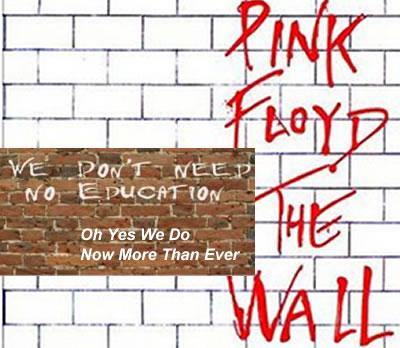 In 1979 the British rock group Pink Floyd came out with a new album entitled The Wall. The album was in part, the personal expression of two of the bandmembers' experience growing up. The Wall is described in Wikipedia as,
In 1979 the British rock group Pink Floyd came out with a new album entitled The Wall. The album was in part, the personal expression of two of the bandmembers' experience growing up. The Wall is described in Wikipedia as,
"... a rock opera that explores Pink, a jaded rockstar whose eventual self-imposed isolation from society is symbolized by a wall ..."
We Don't Need No Education is one of the tunes on the album. It wasn't a protest song against education, per se, but rather the rocker's issues with an individual strict teacher. He describes his negative experience with his teacher as another brick in the psychological wall he had built around himself.
I mention this because during the CoVid crisis we're all sort of building walls around our lives, as we wait for this pandemic to end, in relative walled isolation.
Building walls instead of bridges isn't good for most of us. The world was built on bridges - the exchange of ideas, the trade of goods and services, and the transference of art and culture. We do need education, but We Don't Need No Education does have a good beat and a message obscured by its language. I suppose one might say that's because the rocker's learning experience failed him ... but it takes two to learn ... an educated and thoughtful teacher and a receptive and intelligent student. And one of the things we're learning from the CoVid pandemic is that it seems generally to help when there's a real human connection.
https://www.youtube.com/watch?v=MAe_w9a_IN8













